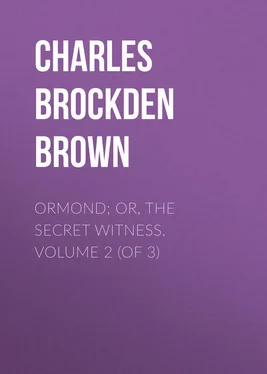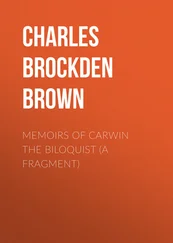Charles Brown - Ormond; Or, The Secret Witness. Volume 2 (of 3)
Здесь есть возможность читать онлайн «Charles Brown - Ormond; Or, The Secret Witness. Volume 2 (of 3)» — ознакомительный отрывок электронной книги совершенно бесплатно, а после прочтения отрывка купить полную версию. В некоторых случаях можно слушать аудио, скачать через торрент в формате fb2 и присутствует краткое содержание. Жанр: foreign_antique, foreign_prose, на английском языке. Описание произведения, (предисловие) а так же отзывы посетителей доступны на портале библиотеки ЛибКат.
- Название:Ormond; Or, The Secret Witness. Volume 2 (of 3)
- Автор:
- Жанр:
- Год:неизвестен
- ISBN:нет данных
- Рейтинг книги:5 / 5. Голосов: 1
-
Избранное:Добавить в избранное
- Отзывы:
-
Ваша оценка:
- 100
- 1
- 2
- 3
- 4
- 5
Ormond; Or, The Secret Witness. Volume 2 (of 3): краткое содержание, описание и аннотация
Предлагаем к чтению аннотацию, описание, краткое содержание или предисловие (зависит от того, что написал сам автор книги «Ormond; Or, The Secret Witness. Volume 2 (of 3)»). Если вы не нашли необходимую информацию о книге — напишите в комментариях, мы постараемся отыскать её.
Ormond; Or, The Secret Witness. Volume 2 (of 3) — читать онлайн ознакомительный отрывок
Ниже представлен текст книги, разбитый по страницам. Система сохранения места последней прочитанной страницы, позволяет с удобством читать онлайн бесплатно книгу «Ormond; Or, The Secret Witness. Volume 2 (of 3)», без необходимости каждый раз заново искать на чём Вы остановились. Поставьте закладку, и сможете в любой момент перейти на страницу, на которой закончили чтение.
Интервал:
Закладка:
"Are they ill search of one or the other?"
"I cannot say they are. Nay, I imagine they would hear any imputation with more patience than that, but certain I am, they stand in need of them. How much would it be to the honour of a man like you rioting in wealth, to divide it with one, lovely and accomplished as this girl is, and struggling with indigence!"
Melbourne then related the adventure of the morning. It was easy for Ormond to perceive that this was the same person of whom he already had some knowledge; but there were some particulars in the narrative that excited surprise. A note had been received from Craig, at the first visit in the evening, and this note was for no more than fifty dollars. This did not exactly tally with the information received from Craig. But this note was forged. Might not this girl mix a little imposture with her truth? Who knows her temptations to hypocrisy? It might have been a present from another quarter, and accompanied with no very honourable conditions. Exquisite wretch! Those whom honesty will not let live must be knaves. Such is the alternative offered by the wisdom of society.
He listened to the tale with apparent indifference. He speedily shifted the conversation to new topics, and put an end to his visit sooner than ordinary.
CHAPTER II
I know no task more arduous than a just delineation of the character of Ormond. To scrutinize and ascertain our own principles is abundantly difficult. To exhibit these principles to the world with absolute sincerity can hardly be expected. We are prompted to conceal and to feign by a thousand motives; but truly to portray the motives, and relate the actions of another, appears utterly impossible. The attempt, however, if made with fidelity and diligence, is not without its use.
To comprehend the whole truth with regard to the character and conduct of another, may be denied to any human being, but different observers will have, in their pictures, a greater or less portion of this truth. No representation will be wholly false, and some, though not perfectly, may yet be considerably exempt from error.
Ormond was of all mankind the being most difficult and most deserving to be studied. A fortunate concurrence of incidents has unveiled his actions to me with more distinctness than to any other. My knowledge is far from being absolute, but I am conscious of a kind of duty, first to my friend, and secondly to mankind, to impart the knowledge I possess.
I shall omit to mention the means by which I became acquainted with his character, nor shall I enter, at this time, into every part of it. His political projects are likely to possess an extensive influence on the future condition of this western world. I do not conceive myself authorized to communicate a knowledge of his schemes, which I gained, in some sort, surreptitiously, or at least, by means of which he was not apprised. I shall merely explain the maxims by which he was accustomed to regulate his private deportment.
No one could entertain loftier conceptions of human capacity than Ormond, but he carefully distinguished between men in the abstract, and men as they are. The former were beings to be impelled, by the breath of accident, in a right or a wrong road, but whatever direction they should receive, it was the property of their nature to persist in it. Now this impulse had been given. No single being could rectify the error. It was the business of the wise man to form a just estimate of things, but not to attempt, by individual efforts, so chimerical an enterprise as that of promoting the happiness of mankind. Their condition was out of the reach of a member of a corrupt society to control. A mortal poison pervaded the whole system, by means of which every thing received was converted into bane and purulence. Efforts designed to ameliorate the condition of an individual were sure of answering a contrary purpose. The principles of the social machine must be rectified, before men can be beneficially active. Our motives may be neutral or beneficent, but our actions tend merely to the production of evil.
The idea of total forbearance was not less delusive. Man could not be otherwise than a cause of perpetual operation and efficacy. He was part of a machine, and as such had not power to withhold his agency. Contiguousness to other parts, that is, to other men, was all that was necessary to render him a powerful concurrent. What then was the conduct incumbent on him? Whether he went forward, or stood still, whether his motives were malignant, or kind, or indifferent, the mass of evil was equally and necessarily augmented. It did not follow from these preliminaries that virtue and duty were terms without a meaning, but they require us to promote our own happiness and not the happiness of others. Not because the former end is intrinsically preferable, not because the happiness of others is unworthy of primary consideration, but because it is not to be attained. Our power in the present state of things is subjected to certain limits. A man may reasonably hope to accomplish his end when he proposes nothing but his own good: any other point is inaccessible.
He must not part with benevolent desire: this is a constituent of happiness. He sees the value of general and particular felicity; he sometimes paints it to his fancy, but if this be rarely done, it is in consequence of virtuous sensibility, which is afflicted on observing that his pictures are reversed in the real state of mankind. A wise man will relinquish the pursuit of general benefit, but not the desire of that benefit, or the perception of that in which this benefit consists, because these are among the ingredients of virtue and the sources of his happiness.
Principles, in the looser sense of that term, have little influence on practice. Ormond was, for the most part, governed, like others, by the influences of education and present circumstances. It required a vigilant discernment to distinguish whether the stream of his actions flowed from one or the other. His income was large, and he managed it nearly on the same principles as other men. He thought himself entitled to all the splendour and ease which it would purchase, but his taste was elaborate and correct. He gratified his love of the beautiful, because the sensations it afforded were pleasing, but made no sacrifices to the love of distinction. He gave no expensive entertainments for the sake of exciting the admiration of stupid gazers, or the flattery or envy of those who shared them. Pompous equipage and retinue were modes of appropriating the esteem of mankind which he held in profound contempt. The garb of his attendants was fashioned after the model suggested by his imagination, and not in compliance with the dictates of custom.
He treated with systematic negligence the etiquette that regulates the intercourse of persons of a certain class. He every where acted, in this respect, as if he were alone, or among familiar associates. The very appellations of Sir, and Madam, and Mister, were, in his apprehension, servile and ridiculous, and as custom or law had annexed no penalty to the neglect of these, he conformed to his own opinions. It was easier for him to reduce his notions of equality to practice than for most others. To level himself with others was an act of condescension and not of arrogance. It was of requisite to descend rather than to risk, – a task the most easy, if we regard the obstacle flowing from the prejudice of mankind, but far most difficult if the motive of the agent be considered.
That in which he chiefly placed his boast, was his sincerity. To this he refused no sacrifice. In consequence of this, his deportment was disgusting to weak minds, by a certain air of ferocity and haughty negligence. He was without the attractions of candour, because he regarded not the happiness of others, but in subservience to his sincerity. Hence it was natural to suppose that the character of this man was easily understood. He affected to conceal nothing. No one appeared more exempt from the instigations of vanity. He set light by the good opinions of others, had no compassion for their prejudices and hazarded assertions in their presence which he knew would be, in the highest degree, shocking to their previous notions. They might take it, he would say, as they list. Such were his conceptions, and the last thing he would give up was the use of his tongue. It was his way to give utterance to the suggestions of his understanding. If they were disadvantageous to him, the opinions of others, it was well. He did not want to be regarded in any light but the true one. He was contented to be rated by the world at his just value. If they esteemed him for qualities which he did not possess, was he wrong in rectifying their mistake: but in reality, if they valued him for that to which he had no claim, and which he himself considered as contemptible, he must naturally desire to show them their error, and forfeit that praise which, in his own opinion, was a badge of infamy.
Читать дальшеИнтервал:
Закладка:
Похожие книги на «Ormond; Or, The Secret Witness. Volume 2 (of 3)»
Представляем Вашему вниманию похожие книги на «Ormond; Or, The Secret Witness. Volume 2 (of 3)» списком для выбора. Мы отобрали схожую по названию и смыслу литературу в надежде предоставить читателям больше вариантов отыскать новые, интересные, ещё непрочитанные произведения.
Обсуждение, отзывы о книге «Ormond; Or, The Secret Witness. Volume 2 (of 3)» и просто собственные мнения читателей. Оставьте ваши комментарии, напишите, что Вы думаете о произведении, его смысле или главных героях. Укажите что конкретно понравилось, а что нет, и почему Вы так считаете.












